It was a beautiful evening on Thursday, July 23, for the farmers of the Tainter Creek Watershed Council to tour Driftless Organics operation in Utica Township, Crawford County.
Driftless Organics co-owner and watershed council member Josh Engel was on hand to conduct the tour, and also provided an organic pork entree, organic veggies and dip, and potato salad for a shared meal. About 30 people attended the field day.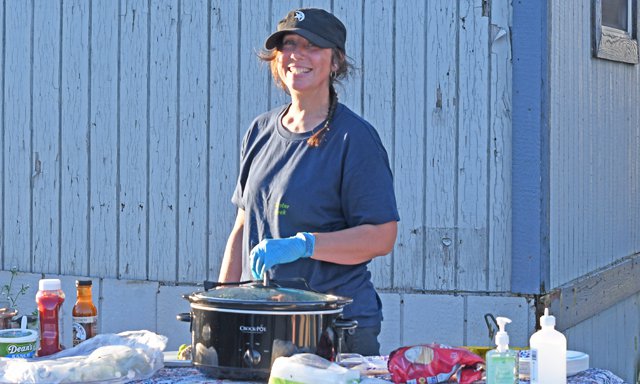

The meeting took place in the parking area in front of the farm’s new vegetable processing and cold storage facility. The facility, according to Engel, was built in 2012.
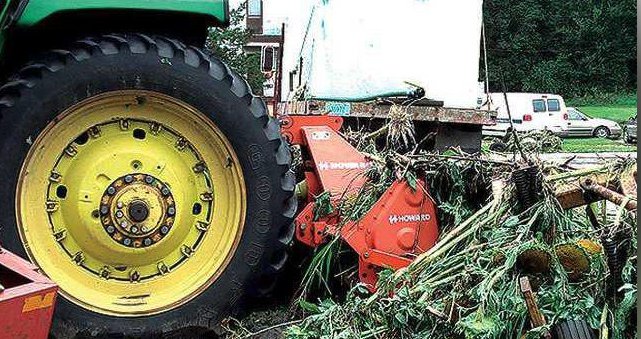

“Up until 2012, we rented the Star Valley Creamery,” Engel said. “The facility got hit so terribly in the 2007 and 2008 floods, we decided to move our operation up to the ridge.”
Engel said that about half to three-quarters of their staff works year round at the farm. Root crops, a major crop of the operation, are stored and packed and shipped for retail sales throughout the year.
“In past years, we’ve run a Community Supported Agriculture (CSA), and also sold vegetables at the Madison Farmers Market,” Engel said. “This year, we decided to skip both – the Madison market in particular was kind of a burnout for our staff.”
Engel said that because of the spike in consumer participation in CSAs during the pandemic, they were actually selling a lot of vegetables to other CSAs to fill out their boxes when their own crops didn’t produce what was needed.
As far as what markets the farm business sells in, Engel said that it includes Gays Mills, Viroqua and LaCrosse on a year-round basis. They also deliver to Madison weekly, Minneapolis twice per week, and occasionally to Milwaukee or Chicago.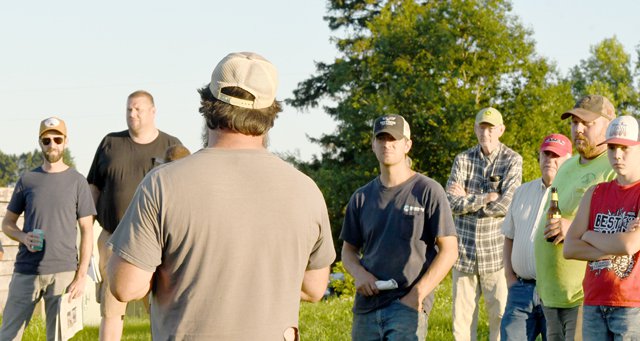

The first fields the group encountered were a contrast in production methods. One was a field of black beans grown to produce dried beans. Engel said that they were being grown organic no-till in a multi-species cover that was nearly as tall as the crop.
“We get a lot of deer pressure on the crop, so letting the covers get as high as the crop seems to help with that,” Engel said. “When the time comes to harvest the beans, we will also get some of the cover crop seeds, and with our separator, we can sort those out and then use them to replant cover crops.”
The other field, just across the grassed lane was beds of beets and carrots planted in beds prepared for planting with a rotovator.
“One of the major challenges in organic is finding ways to reduce tillage in our systems,” Engel said. “As you can see, with some of the recent heavy rains, we’ve experienced some erosion – seed germination without tilling is a difficult problem to solve.”
Engel said that the garlic the farm grows is easier to manage from a soil erosion perspective. The garlic is planted in November, and then heavily mulched.
Engel said the farm has a small high capacity well, which they use to provide irrigation as-needed to all of their ridge top fields. He said their system employs both dripline and overhead irrigation.


Engel also took the group past a couple of fields where he is growing some specialty crops with a very specific audience. Those crops are a heirloom variety hard white wheat, and blue corn. Again, Engel was experimenting with growing cover crops in with the wheat to suppress weeds and predators, and to hopefully generate cover crops seeds for replanting on the farm as well. Indeed, as the group approached, a deer bounded out of the field and into the nearby woods.
“I like being able to produce as much of my own cover crop seed as possible, because seed is expensive,” Engel said. “As far as fertilizer, we have a compost turner and we make our own compost. We also usually purchase a few semis of chicken litter per year as well.”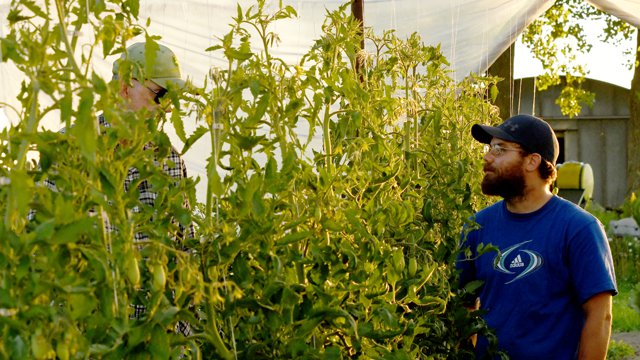

Perhaps the most unusual part of the tour was of a greenhouse where the Engels are growing varieties of slicing and paste tomatoes in an innovative manner.
“We just got this greenhouse on rails up and running last year,” Engel explained. “Right now we’re growing tomatoes, but after they’re done we’ll slide it over on its runners to an empty patch of dirt and grow spinach for late season sales.”
The greenhouse, which Engel said had its covering ripped off in recent straight line winds, was open at both ends, and had rows of tomatoes planted in soil, with landscape cloth covering the soil in the rows in between. The tomatoes were being grown up string that was anchored on the rafters of the house. The foliage was a deep, healthy green and the clusters of green tomatoes were plump and abundant.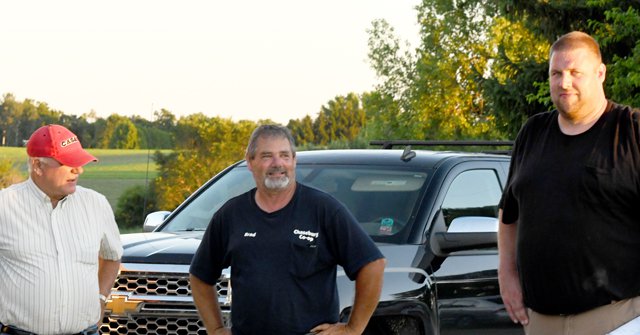

Kicking tires is a favorite past time at farmer gatherings, and this one was no exception. Engel discussed his garlic harvest and drying operation and his seed drying operation. After that, the group discussion moved on to an AirFlo Seeder implement recently jointly purchased by the watershed council and Vernon County Land and Water Conservation Department (VLCD).
“We got our two seed air dryers from a flower farm in Iowa,” Engel said. “We also have a seed separator at the home farm and are setting up a gravity table.”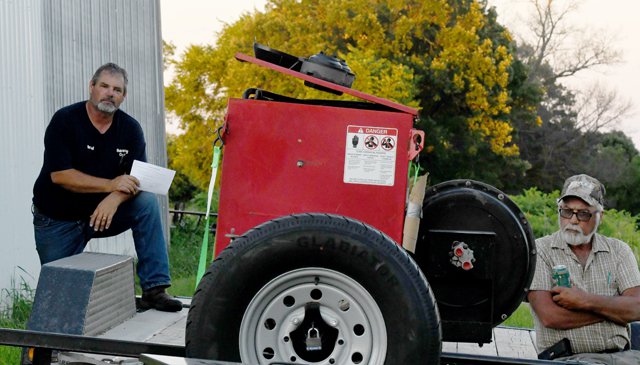

Dani Heisler-Woodill, watershed council member and newly-hired coordinator for the group with Valley Stewardship Network (VSN), initiated a discussion of the watershed council’s newest piece of equipment. The seeder is meant to be attached to a tool bar, and can be used with a twelve-row planter with either six or twelve hoses, depending on what the operator is trying to accomplish in the field.
Woodill asked the farmer-members of the watershed council to fill out a survey indicating what use they are interested in putting the equipment to in their farm operations. This information will guide VLCD employees in calibration of the device.
Cover crop funds
Berent Froiland told the group that there was still funding from the 2019 grant to seed cover crops on 350 acres at $25 per acre, and funding in 2020 for 600 acres.
“We have to use the funds or we’ll lose them, and DATCP has okayed shifting some of our 2020 funding to cover crops since we can’t really hold big events during the pandemic,” Froiland told the group. “Last year we had a cap on acres, but at this point you should e-mail me with whatever your proposal is, and we’ll see what response we get and go from there.”
Woodill reminded the group that the Chaseburg Co-op has become a dealer for Prairie Creek Seed. She said that the company offers some “cool” custom blends, and is a resource available to local growers. She also reminded group members that the watershed’s cover crop funding can be combined with NRCS EQIP funding, making installation even more affordable.

Social media/grants
Woodill told the group that she is working to establish a Facebook page for the group, now that their new logo has been selected. She said that the group should also consider having t-shirts with their logo made.
“Given that we’re establishing a social media presence, the group needs to think about the data that watershed council activities such as surface and well water testing are generating,” Woodill said. “You need to remember that the watershed council owns that data, and that you get to decide how and when it is shared.”
Froiland led the group in a discussion of their application for DATCP funding for 2021, which is due soon. He said that the sub-committee last year included himself, Bruce Ristow, Karen Bolstad, VSN and VLCD.
“Please share any ideas you have,” Froiland said. “Since we’ve been fully funded for three years now, it may become more difficult to obtain funding, especially if there’s a lot of increased interest and new groups.”
Bruce Ristow suggested that soil testing would be one proposal to consider asking to be funded. VSN/VLCD’s Monique Hasseman said that VSN’s water quality monitoring coordinator, Dave Krier, is interested in taking the group’s soil health analysis “to the next level,” beginning some work on water infiltration, nutrient absorption and connectivity.
Vernon County Conservationist Ben Wojahn reported that some farmers in Franklin Township have begun to discuss forming an Agricultural Enterprise Area (AEA) since the township has repeatedly rejected enacting Farmland Preservation Planning Zoning (FPP).
Both AEAs and FPP allow landowners to access a per acre tax credit in exchange for doing soil testing, and writing and deploying a nutrient management plan. Currently, Utica Township, Crawford County, has enacted FPP. This means that landowners in the southern part of the Tainter Creek Watershed are able to access the tax credits.
Monique Hasseman made a brief presentation about the Wallace Center Grazing Study in which the watershed council is participating. She explained that there is funding available for landowners in the watershed interested in converting some of their acres to grazing land, to pay for installation of practices such as watering systems, perimeter and paddock fencing, loading areas, etc.
The group’s next meeting will take place at the farm of watershed council member Jeff Ostrem. The date and time will be announced soon.




